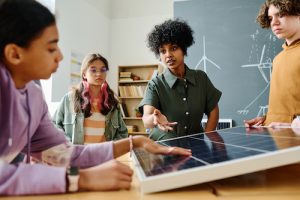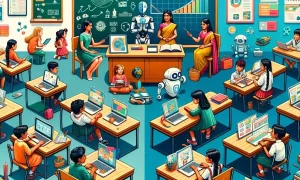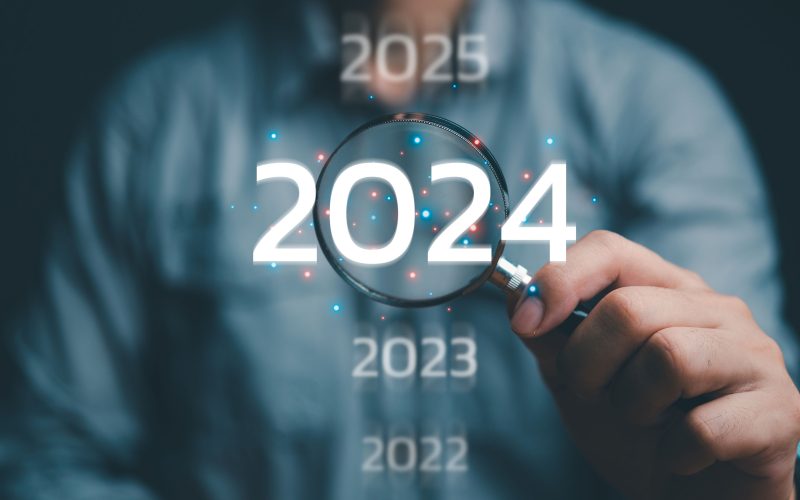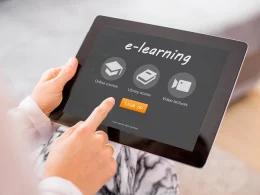Introduction
Meet Dr. Rachel Thompson, a seasoned educator with over two decades of experience in navigating the ever-evolving landscape of education. Dr. Thompson holds a Ph.D. in Educational Leadership and has served as a teacher, curriculum developer, and educational consultant. With a passion for embracing change and harnessing the power of emerging trends, Dr. Thompson is dedicated to helping educators and learners alike thrive in the rapidly shifting educational terrain of 2024.
2024’s Educational Landscape

In 2024, the educational landscape is undergoing a profound transformation, driven by rapid technological advancements, changing student demographics, and evolving societal needs. To thrive in this dynamic environment, educators must embrace key trends reshaping the way we teach and learn.
Personalized Learning Pathways: Empowering Students
Personalized learning has emerged as a cornerstone of 2024’s educational landscape, recognizing that every student learns differently and at their own pace. By tailoring instruction to individual needs and interests. Educators can empower students to take ownership of their learning journey, leading to deeper understanding and improved outcomes.
Global Collaboration: 2024’s Educational Landscape
In an increasingly interconnected world, global collaboration has become essential for preparing students to thrive in a diverse and interconnected global economy. Through collaborative projects, virtual exchanges, and cross-cultural experiences, students gain valuable skills in communication, collaboration, and cultural competence.
Technology Integration: 2024’s Educational Landscape
Technology continues to revolutionize education, offering new opportunities for interactive and engaging learning experiences. From virtual reality (VR) simulations to artificial intelligence (AI)-powered adaptive learning platforms, educators are leveraging technology to personalize instruction, enhance student engagement, and foster critical thinking skills.

Emphasis on Social-Emotional Learning (SEL)
2024 sees a heightened emphasis on social-emotional learning (SEL), recognizing the importance of developing students’ emotional intelligence, resilience, and empathy. SEL programs help students cultivate essential life skills, such as self-awareness, self-management, and responsible decision-making. Fostering well-rounded individuals capable of navigating life’s challenges.
Inclusive Education: 2024’s Educational Landscape
Inclusivity is a driving force in 2024’s educational landscape. With a focus on creating learning environments that are accessible and equitable for all students. By embracing diversity, fostering a culture of inclusivity, and providing targeted support for marginalized groups. Educators can ensure that every student has the opportunity to succeed.
Adaptability and Resilience: Navigating Uncertainty
The ability to adapt and thrive in an ever-changing world is a vital skill for students and educators alike. In 2024, educators are prioritizing the development of adaptability, resilience, and growth mindset. preparing students to navigate uncertainty and overcome challenges with confidence and perseverance.
Professional Development in the Digital Age

Professional development has evolved to meet the demands of 2024’s digital age. With educators leveraging online platforms, virtual workshops, and microlearning modules. To stay current with the latest trends and best practices. By investing in ongoing professional development, educators can enhance their instructional skills, deepen their subject matter expertise, and effectively integrate technology into their teaching practice.
Future-Proofing Education: 2024’s Educational Landscape
As we look ahead to the future of education, it’s essential to anticipate emerging trends and prepare for the challenges and opportunities they bring. By embracing innovation, fostering collaboration, and cultivating a culture of lifelong learning. Educators can future-proof education and ensure that students are equipped with the knowledge, skills, and mindset they need to thrive in the 21st century and beyond.
Visual Table for Key Points:
| Key Trends | Description |
|---|---|
| Technology Integration | Leveraging technology to enhance learning experiences, personalize instruction, and foster critical thinking skills. |
| Personalized Learning | Tailoring instruction to individual needs and interests, empowering students to take ownership of their learning journey. |
| Global Collaboration | Engaging in collaborative projects, virtual exchanges, and cross-cultural experiences to prepare students for a globalized world. |
| Social-Emotional Learning | Developing students’ emotional intelligence, resilience, and empathy through SEL programs. |
| Inclusive Education | Creating accessible and equitable learning environments that support the success of all students, regardless of background. |
| Adaptability and Resilience | Cultivating adaptability, resilience, and growth mindset to navigate uncertainty and overcome challenges with confidence. |
| Professional Development | Investing in ongoing learning and development to enhance instructional skills and effectively integrate technology into teaching. |
| Future-Proofing Education | Anticipating emerging trends and preparing students with the knowledge, skills, and mindset to thrive in the future. |
Comparative Table for Key Features or Benefits:
| Trends | Features | Benefits |
|---|---|---|
| Technology Integration | VR simulations, AI-powered platforms | Enhanced engagement, personalized learning |
| Personalized Learning | Individualized instruction, adaptive learning | Improved outcomes, student empowerment |
| Global Collaboration | Collaborative projects, virtual exchanges | Cross-cultural competence, global perspective |
| Social-Emotional Learning | SEL programs, emotional intelligence | Resilience, empathy, well-being |
| Inclusive Education | Accessibility, equity | Diversity, academic success for all |
| Adaptability and Resilience | Growth mindset, problem-solving skills | Confidence, perseverance in face of challenges |
| Professional Development | Online platforms, microlearning modules | Continuous improvement, staying current with trends |
| Future-Proofing Education | Anticipation, lifelong learning mindset | Preparedness for future challenges, success in evolving landscape |
Conclusion:
In conclusion, 2024’s educational landscape is characterized by innovation, inclusivity, and a commitment to preparing students for success in a rapidly changing world. By embracing key trends such as technology integration, personalized learning, and global collaboration. Educators can create dynamic learning environments that foster creativity, critical thinking, and lifelong learning. As we navigate the uncertainties of the future, it’s essential to remain adaptable, resilient, and forward-thinking, ensuring that education continues to evolve to meet the needs of all learners. With a focus on innovation, collaboration, and inclusivity, we can empower the next generation to thrive in the 21st century and beyond.









